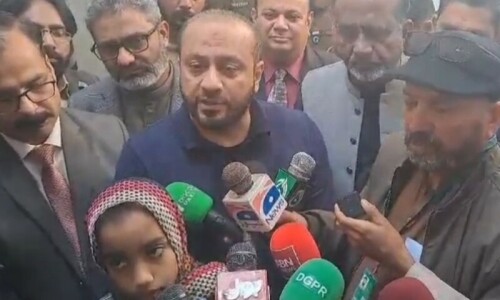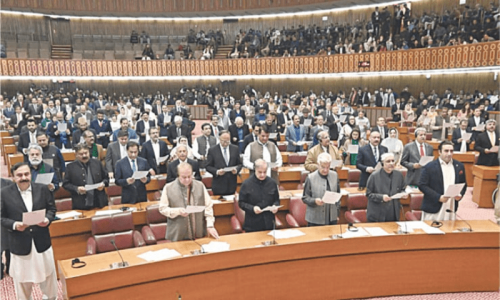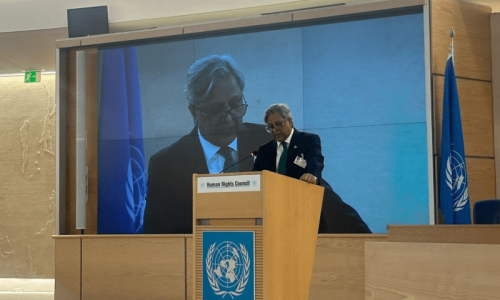ISLAMABAD: A day ahead of the hearing on pleas challenging civilians’ trial by military courts, the federal government on Monday took a stand before the Supreme Court stating that trial of those accused of violence against the armed forces under the Pakistan Army Act (PAA) 1952 was an “apt and proportionate response” under the constitutional framework and statutory regime.
“Violence against the military, defence installations and establishments was a direct attack against the national security of Pakistan and therefore prejudicial to security, interests and defence of Pakistan,” the government explained in a concise statement submitted with the apex court.
A six-judge SC bench will resume hearing on Tuesday (today) of a set of challenges to the trial of civilians under PAA. Headed by Chief Justice of Pakistan (CJP) Umar Ata Bandial, the bench will also consist of Justice Ijaz-ul-Ahsan, Justice Munib Akhtar, Justice Yahya Afridi, Justice Sayyed Mazahar Ali Akbar Naqvi and Justice Ayesha A. Malik.
The government urged the court to dismiss all the petitions, adding that under Article 245 of Constitution, the armed forces have been charged with the obligations to defend Pakistan against external aggression or the threat of war.
“Therefore to create deterrence in respect of such attacks, our constitutional framework allows perpetrators of such vandalism and violence to be tried under PAA,” it said. The episodes involving Shakeel Afridi (who allegedly helped CIA locate the whereabouts of Osama bin Laden) and Indian navy commander Kulbhushan Jadhav were sufficient evidence to indicate that foreign powers were constantly working to destabilise the armed forces and weaken the national security, it added.
According to the government, both the PAA and Official Secrets Act (OSA) 1923 predate the Constitution and have never been challenged to-date. As such all actions taken or being taken under the PAA and OSA are fair exercise of power in accordance with law.
Therefore, it said, the Supreme Court exercising original jurisdiction under Article 184(3) of the constitution over these petitions would be judicially inappropriate, adding that it would deprive the individuals tried under the PAA or handicap the government from invoking appellate jurisdiction of the apex court should they wish to avail the remedy under Article 185 (appeal).
Moreover, it pointed out, in the event these petitions are dismissed, any finding of the court would invariably impact the petitions filed by persons — not parties to the present case — before the high courts under Article 199 concerning the trial of persons under the PAA.
It also pleaded that the case be heard by the full court consisting of all the judges, also reminding that one of the members of the bench, namely Justice Yahya Afridi, in his note had already urged the CJP to consider referring the matter to the full court.
The federal government argued that the trial of suspects — whether military personnel or otherwise — cannot be challenged for being in violation of any of the fundamental rights contained in Part II, Chapter 1 of the constitution, including the rights enshrined in Article 9 (security of person), 10A (fair trial) and 25 (equality of citizens).
Application of army act
Since it relates to the members of the armed forces and is for the purpose of ensuring proper discharge of their duties, the PAA falls squarely within the exception created by Article 8(3)(a) where the fundamental rights did not apply. The statement explained that trials under the PAA were not being conducted against all persons arrested, involved in the May 9 violence, rather those individuals who strictly fall within the offences stipulated in the OSA. Specifically, it added, only those individuals, who infiltrated a “prohibited place” or committed other like offences, within the meaning of OSA were being prosecuted under PAA.
The government pleaded that fundamental rights conferred in Chapter 1 of Part II of the constitution were not applicable to trials under Section 2(1)(d) read with Section 59(4) of PAA since these trials were related to the proper discharge of duties of the members of the armed forces.
According to the government, it is important to highlight that both court martials and the district trial courts have existed concurrently since the creation of Pakistan. The overview of the legal and procedural matrix of court martial and civil sessions courts reveals that both the courts are not at odds with each other. In fact, the persons who are tried under the army act undergo a largely similar process in terms of law and procedure in comparison with the ordinary civil sessions trial.
Published in Dawn, July 18th, 2023


















































